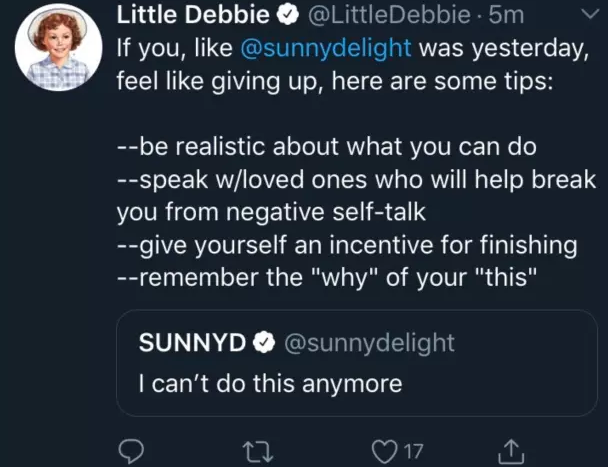6.7. Example: Corporate Brand Authenticity#
Another example of authenticity we can consider is the authenticity (or fake authenticity) of corporate brand accounts.
In the late 2010s, a number of corporate brand Twitter accounts started breaking away from normal, safe and boring corporate topics and began interacting with each other playfully [f45], or addressing real and serious human concerns.

This trend brought complicated issues of authenticity because presumably there was some human employee that got charged with running the company’s social media account. We are simultaneously aware that, on the one hand, that human employee may be expressing themselves authentically (whether playfully or about serious issues), but also that human is at the mercy of the corporation and the corporation can at any moment tell that human to stop or replace that human with another.
One particularly noteworthy corporate brand account was the Twitter account of Steak-Umms, which both delved into serious human topics and into the larger trend of corporate brand account authenticity:
why are so many young people flocking to brands on social media for love, guidance, and attention? I’ll tell you why. they’re isolated from real communities, working service jobs they hate while barely making ends meat, and are living w/ unchecked personal/mental health problems (see whole thread here [f46])
And they also talked about the advertising motives behind supporting social causes (even if some employees do indeed support them), and the advertising motivation behind tweeting openly about how they are basing their decisions based on advertising.
brands that use social causes for marketing do so to meat a bottom line. they calculate decisions based on the risk/reward ratio of advertisers, current audiences, and potential audiences. workers internally may truly care, but the decisions are ultimately based in self-interest
…
when we remind people that brands do what they do to meat a bottom line, it postures us above the problem, but we aren’t. we’re just using self-aware anti-advertising to invoke transparency because it helps our own bottom line. it’s all circular. that’s the tea
steak-umm bless
(see whole thread here [f47])
See also: Brand Twitter Is Absurd, and It Will Only Get Worse [f48]
6.7.1. Reflection question#
What does authenticity look like when something has multiple sources like a corporate brand account being run by an individual employee? Do you think of whether the posts are authentic to the corporation? Or to the employee? Or both?
